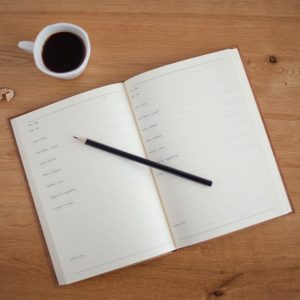 If you’re constantly on the go, you probably have missed a few lunches or dinners. Instead of sitting down to a regular meal, you grab snacks throughout the day. That type of eating is a big reason people overeat. They forget they had that handful of nuts or those crackers and cheese. A food journal is important and a good way to help you become more aware of not only how many calories you eat, but also whether it’s healthy or not.
If you’re constantly on the go, you probably have missed a few lunches or dinners. Instead of sitting down to a regular meal, you grab snacks throughout the day. That type of eating is a big reason people overeat. They forget they had that handful of nuts or those crackers and cheese. A food journal is important and a good way to help you become more aware of not only how many calories you eat, but also whether it’s healthy or not.
How do you start a food journal?
It doesn’t take much. You can go old fashioned with a spiral bound small notebook or update your tracking to your smartphone. You don’t even have to tally those calories along the way, especially if you’re busy. You can always do it later. Some people take a picture of everything they eat, rather than making notes. At the end of the day, they log it and tally the calories. To get even more information, make a note about your mood or how you feel. If you find frustration makes you want to eat crunchy things, be prepared for those times with an apple and ditch the chips.
A food journal is for recording more than just food.
What you drink makes a difference, too. Even if you had the perfect diet for weight loss, but still drank several cans of cola a day, you’d still gain weight over time. You’d also be failing to have a healthy diet. Colas, like most drinks that aren’t plain tea, coffee or water, are filled with sugar. Even diet soft drinks create a problem. Studies show they put on visceral fat—fat around the middle. It’s the most dangerous and difficult to lose fat you can have. If soft drinks are this bad, consider the 500 calories in that Mocha Frappuccino and you get the picture.
Food journaling can help you identify food intolerance and allergies.
Do you find you have indigestion frequently or feel bloated after meals. Take time to jot down when that happens and compare it to your food journal. Noting how you feel before you eat and how you feel afterward can help you find the offending food and save time and money at the doctor’s office. Even if you don’t identify it, having that information readily available for a doctor’s visit will give your health care professional better insight into the problem. Some people use an elimination diet to get to the root cause and find the offending food.
- When you start tracking every bite you eat, you’ll realize that you often mindlessly grab snacks throughout the day. You’ll be surprised at how many times you grab a few chips or candy.
- Food journaling helps you learn portion size. You need to learn portion size to record the food you eat and analyze the calorie or nutrient count.
- When you track your food, you can also balance your macro and micro nutrients easier and ensure you have a balanced diet with adequate protein, carbs and fat.
- Being more aware of what you eat can help you lose weight without dieting. One study showed that just journaling helped people lose weight over a period of three months.
For more information, contact us today at One Love Fit Club
 13609 Central Ave, Ste E Chino, CA 91710
13609 Central Ave, Ste E Chino, CA 91710
